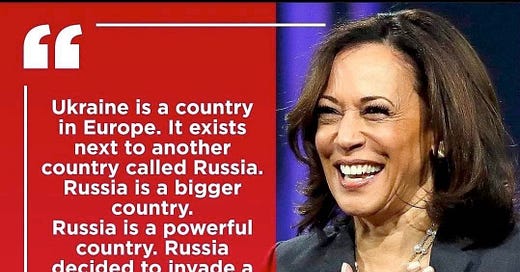A timely history lesson: Ronald Reagan meets the press
A randomly chosen 1983 Reagan interview with several top Washington reporters shows how much he knew about the geopolitics of his nuke-scary world -- and puts both Kamala & Trump to shame.
The Ronald Reagan biopic ‘Reagan’ did OK at the box office — is there still such a thing, and does it matter? — over the Labor Day weekend.
Predictably, the critics sneered and hated it almost as much as audiences liked it.
But for anyone under 30 who knows nothing about Reagan except what they’ve learned in school or from the national liberal media, his amazing life story and accomplishments in office might be shocking.
As our two embarrassing presidential aspirants stumble and crawl and lie and fake their way to the finish line of the 2024 election, the big news was CNN’s taped, closed-to-the-public, sit-down interview with Kamala Harris and her sidekick Tim Walz in last August.
It was a pitiful performance in every way, and it would have been thoroughly mocked and ripped into pieces by an honest media — if Harris’ opponent was anyone other than the hated Donald Trump. But NPR and the New York Times did their best to spin it favorably.
For those who saw the Harris interview with CNN’s Dana Bash and still think she’s qualified to be a U.S. president, here is the shocking transcript of a typical press conference in the Oval Office with Ronald Reagan.
It's from December 23, 1983, and the subject is the administration's accomplishments in 1983 at home and overseas. It was conducted by Helen Thomas, United Press International; James B. Gerstenzang, Associated Press; Michael Gel& Reuters; and Pierre Rousselin, Agence France-Presse.
For all you youngsters in the audience, as Ed Sullivan might have said, the mainstream media of the day was predominantly liberal Democrat.
It wasn't as nasty and as openly partisan as it is today, but the legacy national media of 1983 regularly derided, demeaned and laughed at Reagan, often treating him as an old and almost senile actor an empty suit.
But reading 500 words of this transcript in 2024 should prove to any honest person how superior Reagan's grasp of world events was compared to the embarrassing kindergarten speak of Kamala Harris and the simplistic shorthand blather of Trump.
This snippet from Reagan's nearly 1-hour, Teleprompter-free press conference reminds us of the good days when Arafat and the PLO were screwing up the Middle East:
The Middle East
Q. Mr. President, do you think the new rapprochement between Arafat and Mubarak now opens the way as a breakthrough for the possibility of your peace plan getting moving and Hussein taking part?
The President: Well, Helen (Thomas), I'm always a little leery about saying a breakthrough, but I do think this: We are optimistic about this because if you look at the relationship there and the two countries—or the two peoples that were involved, Mubarak is the head of state of the one country in the Arab world that has gone forward and has a peace treaty with Israel. We're hopeful that the peace process will bring about more Arab nations making their peace with Israel.
Obviously, a part of that process depends on a fair and just settlement of the Palestinian question. And Arafat has, in the past, has been one who has refused to recognize Israel's right to exist as a nation. But the fact that earlier, and before this split in the PLO ranks, he had begun to discuss with King Hussein negotiations and participating in those negotiations on behalf of the Palestinians-then that broke down with the split in the Palestinian movement.
Now I think that what President Mubarak is doing is talking to him about returning to where he was earlier, making contact with King Hussein, and getting those peace negotiations, our peace proposal, underway again.
Q. Do you think there's a good chance?
The President. Yes, I do. I really do, because we had believed that a settlement in Lebanon had to precede going further with that. I don't think that's necessarily true now. I think enough progress has been made there that we can go forward with the peace movement.




